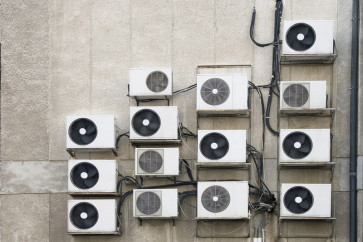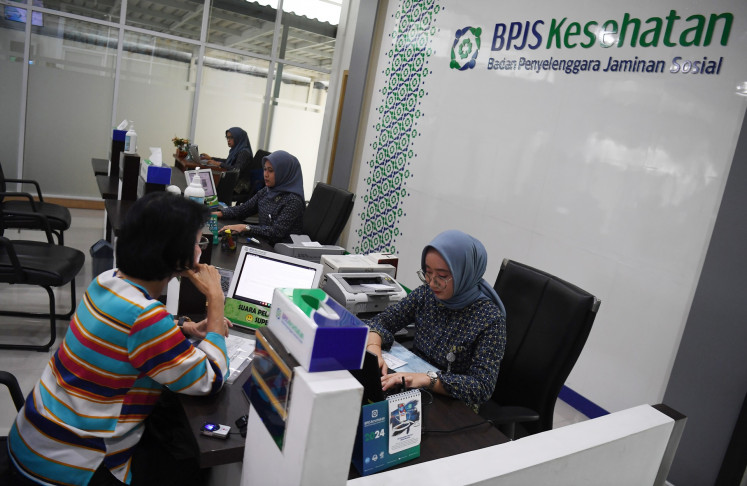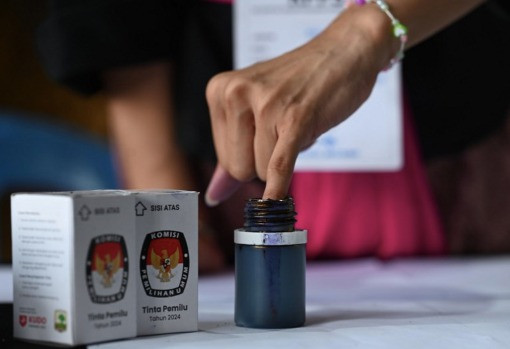Surabaya kids work as paper messengers
A heavy downpour that Monday afternoon apparently did not prevent the will of a school-age girl from approaching stopping cars to sell out the remaining papers on her hands to motorists at the traffic light on Jl
Change Size

A heavy downpour that Monday afternoon apparently did not prevent the will of a school-age girl from approaching stopping cars to sell out the remaining papers on her hands to motorists at the traffic light on Jl. Manyar Street in Kertoarjo, Surabaya.
Offering the plastic-packed papers from one car to another stopping at the traffic light at a busy intersection mornings and afternoons, Maya Anggraeni sold out the papers within one and half hours.
Several times, drivers lent out their hands with the denomination of Rp 1,000 (8 US cent) to the nine-year-old girl, instead of taking her papers.
"I do feel lucky to receive Rp 6,000 plus Rp 2,500 from selling the remaining ten copies of the paper. I gain Rp 2,500 from selling every ten copies," she told The Jakarta Post.
Maya works selling papers at the traffic light almost every day with her elder sister and mother not only to pay her school tuition fee but also support the family.
"I usually earn around Rp 15,000 a day and my mother always gives me Rp 3,000 as pocket money to go to school."
The third grader of an open elementary school in Sawahan district, Surabaya, said they have to collect their papers from at 5:30 a.m. from subagents.
"At 9:00 a.m. I stop selling papers and go to school and back to the traffic light at 3:00 p.m. to help my mother and sister sell the remaining papers," she said.
"We can sell around 100 copies everyday. We usually sell Jawa Pos, Kompas, Surabaya Pos and Surya dailies.
Maya was one of dozens of child paper messengers on the Jl. Manyar traffic light and similar pictures could be also seen at many other traffict lights, including the one at the Pucang traffic light leading to the Dr. Soetomo General Hospital, in the city with a population of 2.9 million people.
Maya's mother, Sutinah, an elementary school dropout in Lamongan, said she and her two daughters came to Surabaya after she was divorced in 2001, to earn their life as they did not have land or other job in their home village.
"Initially, we are begging on the traffic light and then scavenge papers. We have no other alternatives to survive in the big city," she said.
"Thank God, we can spend our nights in a hut in Kenjeran (slum area) and send my youngest daughter to the elementary school."
Chandra, a paper subagent and courier at the Jl. Manyar traffic light, said he distributed around 600 copies of several papers on the traffic light and some 800 copies in Pucang.
"I don't recruit them but they came to me voluntarily to sell my papers," he said.
They and I as a supplier gain mutual profits. That's all."
He added that he has frequently asked the Surabaya public order officers not to crack them down because they were simply earning their life.
Khoirul, the owner of a large paper distribution agency in South Surabaya, said that both publishers and agencies have never had a marketing strategy to employ child workers to sell papers.
"It is the work of subagents giving the papers without any contracts to street children who voluntarily sell the papers to earn their life," he said.
Meanwhile, Plan Indonesia acti-vist Cici Sri Rezeki called on Surabaya city administration to crack down on certain syndicates hiring school-age children in the street marketing of business products.
She said such practices were against Law No. 23/2002 on Children Protection, the 2003 Labor Law prohibiting child workers and UN Convention on elimination of worst forms of child workers Indonesia has already ratified.
"Children aged up to 15 must be in school and their homes and the government has its obligation to bring the street children back to school in efforts to help reduce the stree crimes and sexual abuses," she said,
"With the increased education budget, the government should provide a free education for all children, especially street children."
Chief Editor of the Surya daily Rusdi Amral said his media had never made any policy tolerating the hiring of any children to sell the paper on streets.
"As a media institution concerned over the civil society and education, we reject the involvement of child labor in the press industry, including marketing and promotion section."
The Surabaya Public Order Agency chief, Utomo, said his office and the City Police have frequently netted a great number of beggars, including street children who contributed to the traffic congestion, but they kept returning to the streets after being released.
He said his agency had several times recommended the city administration to issue a bylaw carrying sanctions to motorists opening their windows to make donations to beggars and buy candies or papers at traffic lights but it sparked strong opposition from the City Council.
The Surabaya Manpower Agency head, Imam Syafi'i, said the city public order officers had conducted regular operations to net school-age children to be placed at a dormitory managed by the Surabaya Social Affairs Agency. The children then can have free education.
"The school-age children should no longer be on the streets because the city administration has provided free education for them," he said.
Mohammad Ulil Absor, ILO project manager of the elimination of worst forms of child labor in East Java, said the government should give more attention to pull out the street children and take them back to school to enforce the child protection law and the anti-child labor law.









